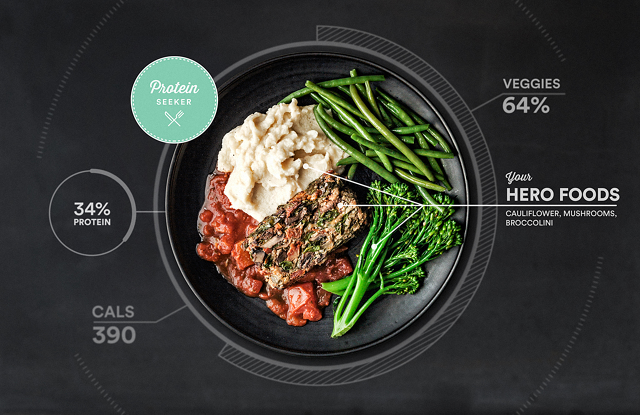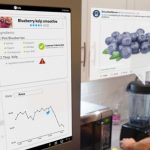This Startup Sells You Meal Plans Based On Your Nutrition Type
After Neil Grimmer sold his organic baby food startup to Campbell’s Soup, he took a long, hard look in the mirror. The fast food, stress, and late nights involved with running a business had taken their toll.

A typical entrepreneur, Grimmer was determined to do more than get a gym membership and eat more broccoli. He made an appointment with a functional medicine specialist, who ordered a battery of tests. Grimmer was informed by the doctor in no uncertain terms that he was overweight, at risk for a heart attack, and verging on pre-diabetic; the doctor prescribed a meal plan to help Grimmer get in shape. “Through nutrition and behavior change, I was able to get a lot of that back in line,” he says.
Grimmer’s new startup, called Habit, aims to help others achieve their goals, whether it’s to lose weight or sleep more soundly. The company, which is launching in January, offers a $299 blood test to screen for 60 biomarkers, including amino acids, vitamin levels, and blood sugar, as well as some genetic variants that may play a role in how an individual responds to diet. The company is also attempting to test a users’ metabolic rate through a “challenge,” which involves drinking a milkshake-like beverage to understand how they respond to fats, carbs and sugars, and then sending in another set of blood tests.
Those who sign up will take their own blood at home, granted they’re not squeamish (the company has a network of doctors it is working with that authorize these tests). After sending back the sample, they are offered a 30-minute virtual consultation with a registered dietitian who makes nutrition recommendations, but will not diagnose a disease. “If there’s something in the data that suggests an illness that needs to be addressed, someone on our team will tell the patient to see a physician,” says Grimmer. Users have the option to download the data in a raw format to take it to a doctor, he adds.
Habit places users in one of seven buckets, or types, based on their results, such as a “Protein Seeker.” These types were created by Habit, and are accompanied with a caloric breakdown of how many carbs, fats, and proteins to eat on any given day. From there, they have the option to buy Habit meals customized to their category for between $12 and $15 apiece.

Believing that people will opt to purchase a meal plan is the crux of the company’s business model: The market for meal-delivery services is now valued at $210 billion, according to Morgan Stanley Research, while the margins for this kind of blood testing are thin. The company is hoping that it will stand out in a crowded space, which includes Blue Apron and Nutrisystem, as it doesn’t take a one-size-fits-all approach to nutrition.
“We aren’t in the business of fad diets and suggesting that a food is good or bad and should be avoided,” says Joshua Anthony, a scientific advisor to Habit and the vice president of global nutrition at the Campbell Soup Company. “It’s about tailored advice like whether an individual has an increased need for carbs, for instance, or might not be managing glucose well.”
Beta users of the service, such as Mike Minium, a former corporate technologist who opened the CrossFit Oakland gym more than a decade ago, say the recommendations did prove helpful. After sending in a blood sample, Minium was advised to eat more carbohydrates later in the evening to reach his goals of sleeping better and maintaining a consistent weight during the tennis season. “Going into it, I was skeptical,” says Minium. “But going through the process and implementing the differences, I did make some changes in some key areas.”
It remains to be seen whether the service will have an impact on patients in the long term; thus far, only about 100 people enrolled in the beta. Habit says it is working on a study with Stanford to demonstrate the efficacy of these interventions, including a randomized, double-blind study slated for 2017.
Some scientists are skeptical about any companies that offer health tests to healthy people. Many studies have found that screening those who have no real complaints or symptoms isn’t an effective way to improve health and wellness. For that reason, some in the scientific community reacted strongly to investor Mark Cuban’s suggestion on Twitter than everyone who can afford to should have their “blood tested for everything available.”
“There are like 12 things you could do without taking blood,” adds Arthur Caplan, professor of bioethics at New York University’s Langone Medical Center. “Lose weight, exercise, wear a helmet, and don’t abuse opiate drugs.”

Some recent studies have shown that personalized advice is more effective in helping people make changes to their lifestyle than more general edicts: Eat less salt, more vegetables. What remains to be seen is whether health tests are necessary, as well as prepared meals. As Jordan Shlain, a a Bay Area-based primary care doctor and entrepreneur, puts it: “I could take an honest look at a person’s diet and make recommendations without a single test.”
Others defend Habit’s approach, making the case that even those who appear to be generally well can still learn something by getting tested. Some might find that they’re not as healthy as they might think, says Cyrus Khambatta, a nutritionist who consults with Bay Area clients, with a focus on those with type 1 diabetes. “Even if you think you’re healthy, you could still adopt better practices based on evidence-based research.”
A firm proponent of this brand of thinking is the well-known biologist Leroy Hood, who serves as a scientific advisor to Habit. Hood has a theory he calls “scientific wellness,” which he describes as “assessing biological data to make appropriate recommendations that include wellness.” It’s distinct from the traditional wellness category in Silicon Valley—think Fitbit and Jawbone—because of the scientifically validated metrics, says Hood. And the insights are intended to be actionable.

Hood says he is currently working on several longitudinal research studies to prove the efficacy of scientific wellness through his work at the Seattle-based Institute for Systems Biology, an affiliate of Providence Health. He also views this category as a huge potential moneymaker in the future, and is advising another company in this space: Seattle-based Arivale, which charges $3,500 to aggregate health information through a range of tests, and assigns each member a coach to make health recommendations by phone.
None of these services come cheap, which raises the question of whether startups like Arivale and Habit will make a dent in overall health. As is the case with many Silicon Valley health startups, the focus is on those who are tech-savvy, health-conscious, curious about data, and (most importantly) can afford to spend on both tests and healthy food.
In the United States, one third of people are obese and another third are overweight. People who live in poverty are the most prone to obesity, with many lacking access to sufficient fresh ingredients, which increases the risk of chronic diseases like heart disease and type 2 diabetes. Those who have one or more of these diseases are responsible for 86% of overall health care spending, according to the Centers for Disease Control and Prevention. Can scientific wellness help these individuals?
Grimmer says he can’t “cheap out on the science of food,” but sees it as a goal to make sure that he can bring down the price through scale. “I’ve set up the company so we have our benefit baked into the bylaws,” he says. “We want to make it available to at-risk populations, whether it’s to manage hunger, obesity, or any other condition.”
related video: Are Mega Food Courts Good For The Food Industry?
Fast Company , Read Full Story
(37)














